Ideas Worth Teaching, the weekly email digest from the Business & Society Program, supports business school educators with resources curated to prompt conversations about the relationship between corporations, capital markets, and the public good. We’re expanding our approach with a special feature in the first issue of each month offering an in-depth look at how an academic has implemented transformative teaching.
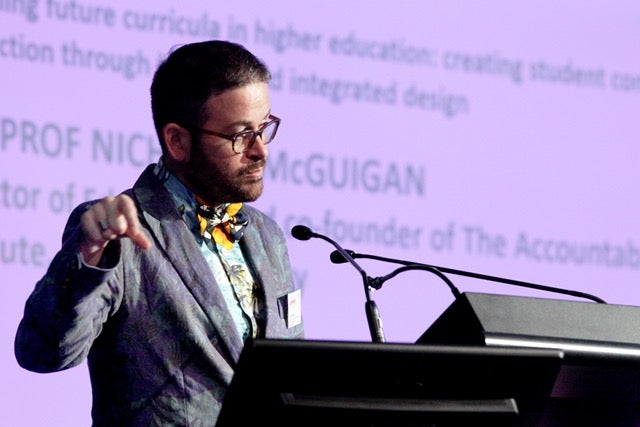 Nick McGuigan was an obvious choice for this inaugural feature. Currently Associate Professor in Accounting at Monash University, Professor McGuigan has been recognized by the Australian Business Higher Education Roundtable for his exceptional teaching. A co-founder of The Accountability Institute, and a deeply engaged participant in the Business & Society Program Undergraduate Convening, Professor McGuigan brings an intensely humanistic approach to a discipline where it might be least expected.
Nick McGuigan was an obvious choice for this inaugural feature. Currently Associate Professor in Accounting at Monash University, Professor McGuigan has been recognized by the Australian Business Higher Education Roundtable for his exceptional teaching. A co-founder of The Accountability Institute, and a deeply engaged participant in the Business & Society Program Undergraduate Convening, Professor McGuigan brings an intensely humanistic approach to a discipline where it might be least expected.
What is your vision for how accounting could be taught differently to change its societal impact?
External factors – economic, ecological and sociological – are impacting the accounting profession and challenging current business environments. The future of work, innovation, sustainability, over-consumption of resources, climate change, and political instability represent systemic factors which will reshape the business decisions that professional accountants are called on to inform and make.
The era of artificial intelligence, automation and global connectivity, is transforming how human populations live and work. New technologies have already begun to revolutionize the information available to accounting professionals making business decisions much more complex. Accountants are therefore increasingly being asked to think in more creative, diverse and integrated ways, questioning:
- What world will future accountants be accounting for?
- What is meant by value and measurement?
- How do we account for ‘creative economies’?
- What role does accounting play in a crypto-economy?
- How do accountants embrace new forms of human behavior and contribute to new ways of organizing and governing?
A smarter, more connected world requires individuals to demonstrate enhanced resilience, agility, ethics and critical thought. The need for accountability in such a world is paramount. Professional working capacity that depends on high levels of imagination, creativity, persuasion, and empathy are increasingly significant in an automated world.
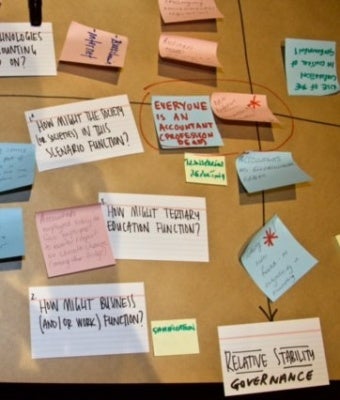 An embedded culture of innovation within accounting curricula is essential to ensure accounting graduates are equipped with the enterprising capabilities necessary in navigating their own livelihoods amongst the professions of the future. This will require significant attention to broader attributes and capabilities that relate to an individual’s self-development. Exposure to diverse curricula content and contexts, learning spaces and methods along with an exploration of accounting as a complex social construct will be essential to learner development.
An embedded culture of innovation within accounting curricula is essential to ensure accounting graduates are equipped with the enterprising capabilities necessary in navigating their own livelihoods amongst the professions of the future. This will require significant attention to broader attributes and capabilities that relate to an individual’s self-development. Exposure to diverse curricula content and contexts, learning spaces and methods along with an exploration of accounting as a complex social construct will be essential to learner development.
What have you learned about getting other faculty excited about curricula that delivers on this vision?
Accounting would have to be one the most conservative, risk-adverse, narrowly-defined disciplines there probably are! And for good reason – so much value is placed on accounting’s key underlying assumptions of conservatism, compliance and risk avoidance – after all we are managing other people’s money.
However, we are moving towards a future where risk-aversion and conservatism are no longer an option. Our profession is being disrupted and we will need to adapt to ensure our relevance.
This can often be confusing and at times disorienting for faculty and so it is important to actively provide an optimistic visioning of what that future could look like in order to excite accounting faculty. As Co-Chair of the Accounting and Finance Association of Australia and New Zealand Accounting Education Special Interest Group we try to do this through curated annual meetings that explore future-oriented themes such as “Accounting Education Post Neo-Liberalism”, “Accounting Education and the Senses” and the forthcoming “Accounting Education and Diversity”.
How are you using technology to open up new possibilities in the classroom?
So much of our educational energy now focuses on technology. Technology distracts if it becomes an end in itself. It is from this perspective I design for the classroom.
My work makes use of Baxter-Magolda’s constructivist-developmental pedagogy to blend curricula across disciplines, to engage individuals, and to open up new possibilities and spaces for learning. This has three key design elements:
- Validate learners as knowers
- Situate learning in the learners’ experience
- Value learning as the mutual construction of meaning between learners and educator.
As individuals experience the world around them in qualitatively different ways, the classroom is a space for learners to explore their lived experience, contextualize this experience and create their own conceptual understanding of accounting within society, the profession and their own lives.
I use technology as an instrument to pursue this pedagogical design. It allows learners to have a more active voice in their own learning, enables them to more easily bring their own context into the learning, to critically question what is being discussed and to actively curate their own learning journey through resource and artifact presentation.
In his previous role at Macquarie University, Prof. McGuigan pioneered the use of tech tools in innovative teaching.
Your activities are extremely varied – I’m thinking of the Queering Accounting and the first-ever Accounting Perfume. Could you say a little about these, and how they intersect with the goals of your teaching?
That is certainly an accurate observation – I am naturally very curious and could not be happier when I am faced with new learning opportunities – this has opened up a diverse path, enabling me to take on broad projects that cross-over traditional boundaries.
I am constantly looking for new sources of inspiration and seeking innovative ways to blend these with my own practice. This can prove challenging in accounting – but embracing the peripheral, working at the edges and sourcing experiences outside my comfort zone can be incredibly rewarding. I model this behavior in my own teaching by encouraging learners to embrace new and often challenging experiences that require more personal humanistic connection to and an active discovery and exploration of economic frameworks and accountability.
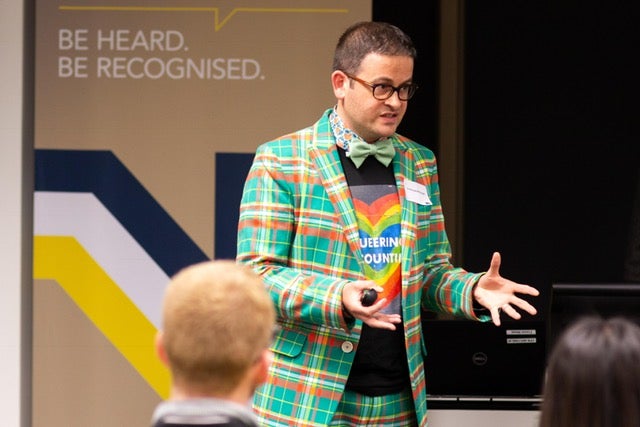
Queering Accounting began as an explorative investigation together with a colleague, Dr. Alessandro Ghio, into the perceptions of creativity, innovation and leadership amongst LGBTQI identifying accountants. It commenced from the premise that diversity and inclusion in accounting firms cannot be about assimilation of LGBTQI peoples with the predominant, hetero-normative structures currently present in the profession. Rather, true diversity and inclusion requires a ‘coming-out’ of accounting firms in order to meet LGBTQI identifying accountants in the middle to advance more meaningful inclusion. As we progressed with the work, we became increasingly curious about what accounting might look like re-imagined through queer eyes. Given the social impact of this work, we also use this project to question traditional means of research dissemination and experiment with new methods like Instagram and LinkedIn. To envisage this, we are holding the world’s first Queering Accounting artist residency in Sydney, Australia, constructing a ‘shop-front’ window to make visceral use of the concepts of visibility, transparency and accountability to bring out diverse queer voices from across the professional, academic and public communities. So, equally this project has become a creative means in which to subvert the norm and creatively explore new possibilities.
At our most recent conference meeting we asked faculty across Oceania what it would be like to educate accounting through the use of the human senses. How could you touch, taste, see, hear and smell accounting?

To progress thought we worked together with a local perfumer, Fleurs du Mal, to create the world’s first accounting perfume. The explosive trio of perfumes set out to explore the olfactory properties of accounting, playfully bringing sensuality back into what has become a rigid, technical, data-driven operation.
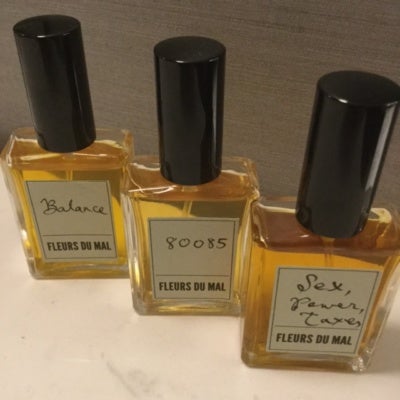
80085 plays with the process of accounting – exhibiting the smell of toner ink, envelopes, fluorescent lights, office carpet, late nights and the utter dreariness of hard work. Sex, Power and Taxes, a bold scent that lays bare a person’s character in their financial transactions as their habits, passions, and morals can all be deduced from what they spend their money on. Balance comes full circle to evoke ideas of balance and moderation in both life and professional conduct. It is fresh, modest even, with bracing, intelligent citrus notes that contrast with a vanilla-and-woods base to convey the cosy sense of security and well-being that is the result of knowing that one’s affairs are all in order.
This was further conceptualized through a perfume master class that enabled faculty to match scent with corporate annual reports, held in iconic New Zealand fashion house, World: Factory of Ideas and Experiments.
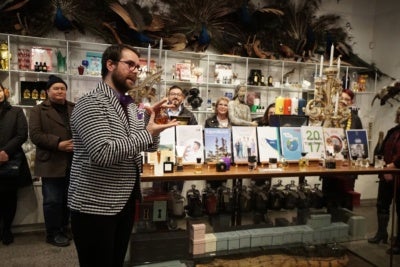
The projects that I am most interested in, such as Queering Accounting and the Accounting Perfume, enter trans-disciplinary spaces, blend contexts, explore alternative perspectives, and challenge contrived learning spaces and places. They aim to break with an oppressive business monoculture to actively question traditional rhetoric and rather emphasize an imagining of what could be. This same sensibility intersects with my teaching goals and belongs at the heart of any transformative educational experience.
What sort of responses from students do you look for to know you’ve been successful with your goals?
I really like instigating the ‘aha’ moment together with learners. In Critical Perspectives on Accounting, Ursula Lucas refers to this as the ‘moments of surprise’ that commonly occurs within learning. She describes this in respect of both the educator and learner. The educator can be “pulled up short” recognizing the unexpected impact of a learning activity and thus be impelled into reflection. Likewise, learners experience moments where they are “pulled up short” and question taken-for-granted assumptions about themselves and the discipline.
The best moments in my teaching happen when I am not ‘present’ or ‘(con)fronting’, rather you will find me on the outskirts of the learning space, monitoring, reviewing and surveying the class as a means of guidance. Learning happens when individuals are active, engaged and motivated and this is where I see the best use of my own time and energy as an educator. Education then becomes a form of hospitality.
A hospitable education suggests learning as a cohabitation of lifeworlds – the learners’ and the educators’. We need to ask:
- Is accounting education about the learners’ world or the world of the educator?
- Or, is it about bringing these two worlds closer together?
- Are accounting educators guests or hosts?
- Are accounting educators simply temporal visitors within the learners’ lifeworlds?
It is with this hope that such exploration will take accounting education to places not previously explored – undiscovered terrain that will help shape the current discourse and transform accounting education practice.
Interested in more innovative insights for business education? Browse our complete collection of interviews with outstanding educators, and subscribe to Ideas Worth Teaching!

